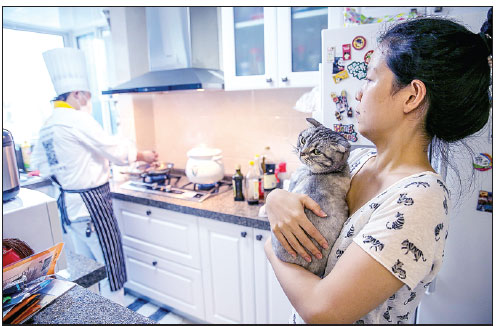A Beijing startup makes home kitchens communal MA SI
With developments in mobile applications, a stranger's car can be hailed in an instant. An apartment owned by someone you've never met can be rented within the hour. But while these two have always seemed ideal for sharing, no one, until recently, thought the kitchen could be for anyone but the familiar.
Home-Cook, a two-year-old startup in Beijing, is rethinking that notion. It wants to make the kitchen communal and has created an online marketplace to match diners with hosts who are willing to share their home-cooked meals.
"We are targeting white-collar workers who are increasingly tired of standardized meals from fast-food chains and restaurants. They want home-cooked meals, which are generally healthier and more personalized, but who are often too busy or too tired to cook," said Tan Jing, co-founder and chief operating officer of Home-Cook.
The company launched a mobile app in 2014 to allow its users to access meals made by people within radius of 3 kilometers. They can either visit the host's home to pick up their meals or have the food delivered. It has more than 1.3 million registered users in four cities and more than 50,000 hosts have applied to be part of the initiative.
For the hosts, who thus far are mostly retirees and housewives, the app offers them a chance to make a bit of money and meet new people.
All hosts are required to register with their real names and be equipped with a health certificate, a requirement of employees in China's food and catering industry.
"Ensuring food safety is the key to the business model," said Tan, who added that it's especially important in China, where food scandals are frequent.
The company implements strict rules in vetting the hosts, examining both their cooking skills, what their menu will consist of and their homes. Visitors can also rate a host's performance.
To handle disputes, the company partnered with PICC Property and Casualty Co Ltd, a major insurance company in China, to insure every meal ordered through the app.
"Our platform has handled several million orders thus far, but the insurance claim ratio is far lower than the average rate in the catering industry," said Tan, who declined to disclose the specific figure.
Li Pengfei, a 26-year-old computer programmer in Beijing, said he uses Home-Cook five times a week.
"I am from Hunan, a province known for its spicy food. But it is often difficult to find authentic Hunan cuisine in this city. Through Home-Cook, I found a couple who excel in cooking Hunan food. Their dishes taste like my mom's. The price is also cheaper than the food ordered at restaurants."
Liu Xuwei, an analyst at Beijing-based Internet consultancy Analysys International, said Home-Cook is trying to differentiate its services from the takeout and delivery apps such as Ele.me and Meituan-Dianping.
And despite Home-Cook's strict food safety measures, it is working in a legal gray area.
"The platform and the hosts do not have the necessary licenses needed to work in the catering industry. The legal risk is far greater than the ride-hailing apps," he added.
He also pointed out that if a host has over 80 orders a day, there will be no fundamental difference from the meals cooked by a restaurant.
|
A Shanghai resident surnamed Zhang holds her cat while watching a professional chef cook for her at home. Ding Ding / Xinhua |

























